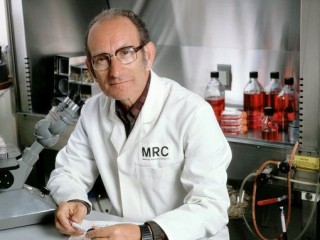
Cesar Milstein biography
Date of birth : 1927-10-08
Date of death : 2002-03-24
Birthplace : Bahia Blanca, Argentina
Nationality : Argentine
Category : Science and Technology
Last modified : 2011-12-19
Credited as : Biochemist, antibody researches, Nobel laureate
4 votes so far
Milstein, working with his post-doctoral fellow, Georges J.F. Köhler, discovered a way to generate large quantities of specific antibodies. Called "monoclonal antibodies," their technique starts with a cell which naturally recognizes invaders and produces antibodies, and fuses that cell to a tumor cell, which lives and reproduces indefinitely, effectively creating a microscopic factory that produces specific antibodies.
Millstein and Köhler announced their finding with a short letter to the scientific journal Nature, writing that it "could be valuable for medical and industrial use," though Milstein worried that such a claim might seem "immodest". It was one of the most important twentieth-century breakthroughs in medical science, and triggered greatly increased use of antibodies in research, diagnostic tests, and drug therapies against numerous cancers, AIDS, and other diseases. Milstein and Köhler won the Nobel Prize for Medicine in 1984, sharing the award with Danish scientist Niels K. Jerne.
Raised in Argentina, Milstein became an outspoken political opponent of Juan Peron, and eventually fled the country for his own safety. He spent most of his career at Cambridge, where he became a naturalized Englishman (while never renouncing his Argentine citizenship), and worked with two-time Nobel laureate Frederick Sanger.
He was married to biochemist Celia Prilleltensky, who worked in a different laboratory at Cambridge and was occasionally her husband's collaborator and co-author on scientific papers. He retired in 1995, but remained a frequent presence in his lab almost to the day of his death.
He was elected a Fellow of the Royal Society in 1975, was a fellow of Darwin College, Cambridge from 1980 to 2002, awarded the Louisa Gross Horwitz Prize from Columbia University in 1980, won the Copley Medal in 1989, and became a Companion of Honour in 1995.
















